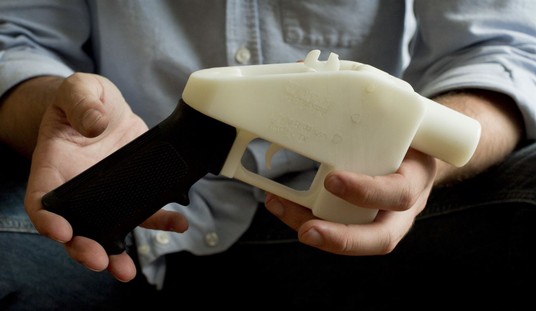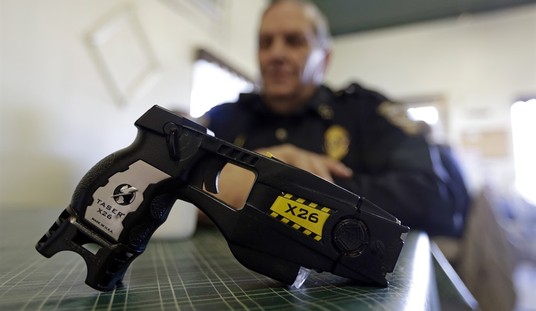The problem with laws is that they are written by man, and are therefore fallible.
Often times laws are rushed into existence without adequate care or deliberation to solve a temporary problem, only to prove itself to be both oppressive and archaic as time marches on.
That headlong rush towards poorly-formed permanent solutions for temporary problems has gotten far worse in recent decades as we’ve become a society who demands instant solutions, and who has allowed the federal government to become bloated, large and arrogant.
Nowhere is that more evident than with federal gun laws.
For the first 227 years of the United States, from the time the Constitution was ratified in 1789 until 1934, Congress respected the view of the Founding Fathers who held quite seriously that the federal government was prohibited from passing any laws regarding firearms whatsoever.
The power of the sword, say the minority…, is in the hands of Congress. My friends and countrymen, it is not so, for The powers of the sword are in the hands of the yeomanry of America from sixteen to sixty. The militia of these free commonwealths, entitled and accustomed to their arms, when compared with any possible army, must be tremendous and irresistible. Who are the militia? Are they not ourselves? Is it feared, then, that we shall turn our arms each man against his own bosom. Congress has no power to disarm the militia. Their swords and every terrible implement of the soldier are the birthright of Americans.
— Founding Father Tench Cox, Pennsylvania Gazette, Feb. 20, 1788
The Founders wanted to ensure that citizens would always be armed with weapons of contemporary military utility to keep both foreign enemies and domestic despots in check.
That common sense understanding that “shall not be infringed” meant precisely what it said lasted until an arrogant progressives forced the 18th Amendment down the throats of the American people, declaring the production, transport, and sale of alcohol to be illegal.
As demand for alcohol beverages remained high despite the law, organized crime families developed to fill the demand, and the wars they fought over territories, over illegal breweries, in hijackings,, etc were legendary. These gang wars and the attempted assassination of President Franklin D. Roosevelt in 1933 led progressives—yes, the same people who created the problem in the first place—to place a punitive tax and registration requirement on all handguns, short-barrel rifles (SBRs), Short-barrelled shotguns (SBSs), as well as machine guns, and “destructive devices.” Silencers were thrown into the bill because of concerns that silencer-equipped poachers would decimate wild animal populations as Americans starved through the Great Depression.
Ultimately, handguns were exploded from the final version of the bill, and the legality of the NFA has largely gone unchallenged. The only Supreme Court case directly related to the constitutionality of the National Firearms Act, United States v. Miller, was uncontested.
Silencers Should Be Pulled From The National Firearms Act
Wild game herds have rebounded spectacularly from the first half of the 20th century, and game biologists seem to have arrived at the consensus opinion that herds are so large now that more drastic culling of herds is required to preserve habitat required by other species.
Put bluntly, the reason silencers were included in the National Firearms Act is no longer relevant.
Despite Hollywood’s obsession with portraying silencers as the tool of assassins, criminals simply don’t show much interest in them. While they are simple to make—they’re not any more complex than your car’s muffler, and the technology for both was created by the same man—they add length and weigh to firearms that criminals trying to covertly carry weapons simply don’t want.
Where are silencers popular today?

Silencers are increasingly becoming common for firearms trainers, hunters, and firearms enthusiasts who train a lot.
New shooters find it easier to focus on safe gun handling when they don’t have to contend with the concussive blast of the gun going off.
Hunters—many of whom eschew hearing protection to better hear game animals and other hunters for reasons of safety—like the reduced noise.
Silencers are also a welcome addition on any home defense firearm or firearms fired on indoor ranges.
The cure
Silencers should be removed from the NFA entirely. At most they should be treated like firearms, and purchased via a normal ATF 4473 and background check. Frankly, I don’t see any need for even that level of regulation. We’re talking about a muffler, people.
In a sane world, it would be no more difficult to buy a silencer than buying a sling, magazine, scope, or other firearms accessory. There is no compelling logical to regulate them at all.
Short-Barreled Rifles Should Be Pulled From The National Firearms Act
When progressives rammed through the National Firearms Act in 1934, they were concerned with criminals cutting down full-power rifles like the BAR and the sawed-off shotguns, such as those popularly used by bank robbers Bonnie Parker and Clyde Barrow (below).

A completely arbitrary barrel length of 16″ was decided upon, and rifles with shorter barrels had the $200 tax imposed upon them.
As with silencers, time and technology have has proven the National Firearms Act language regarding short-barrelled rifles (SBRs), pistols, and so-called “any other weapons to be archaic.
Firearms of all kinds have evolved to fire smaller caliber bullets from smaller and lighter firearms, to the point that the difference between a pistol and an SBR is one of tiny, nearly irrelevant cosmetic details that only matter because the use of a “wrong “accessory can lead the lengthy prison sentence for “manufacturing” a SBR.
This meme of one of several which shows visually just how silly the NFA is regarding pistols, SBRs, and a catch-all class called “any other weapons” (AOWs).

Yep, adding a $15 vertical foregrip or a stock to a pistol can put you in prison for 10 years. It’s frankly insane.
The SBR classification is rendered even more absurd by the reality of pistol stabilizing braces, and the bizarre contortions the ATF is forced to make as the line between pistols and SBRs becomes ever-more blurred.

The firearm on the top in this photo is a Sig Sauer 550-series pistol with a stabilizing brace. It can be sold anywhere, to anyone who can legally own a handgun, without other restrictions. The photo on the bottom is a restricted Sig Sauer 55-series SBR.
They’re identical in caliber, rate of fire, accuracy, and in every other way that matters, but the one on the bottom requires a $200 tax stamp, registration, and a lifetime of hassles regarding travel and where you can use it.
The cure
It’s silly for SBRs to still be part of the National Firearms Act in 2016, when rifle-class “pistols” are now ubiquitous and are not a significant source of firearms used in crimes. It’s time for short-barrelled rifles to be pulled from the National Firearms Act. It was a silly idea in 1934, rendered absurd by the realities of firearm design in the 21st century.
SBRs should simply be done away with as a classification and treated the same as any other rifle, regardless of barrel length.
Repeal the Spiteful Hughes Amendment
The so-called “Hughes Amendment” was a bit of legislation spitefully added to the Firearm Owners Protection Act (FOPA) of 1986, itself an attempt to reform some of the deficiencies of the Gun Control Act of 1968, which itself is another infringement on the Second Amendment which hasn’t been seriously challenged at the Supreme Court.

William J. Hughes, an anti-liberty New Jersey Democrat, slipped in a controversial provision to FOPA that outlawed the new manufacture of machine guns for the civilian market, even though legally owned machine guns had never been used in a crime since 1934 up until that point, and are still highly regulated under the NFA.
This spiteful thumb-in-the-eye of law-abiding gun owners has served to only drive up the prices of machine guns manufactured prior to 1986, and has not affected crime in any way, shape or form.
The cure
A simple one-line amendment to any federal law that strikes out the Hughes Amendment.
The repeal will actually serve to aggravate some who have financially invested in pre-’86 machine guns, but would allow law-abiding citizens who are willing to deal with the aggravation of the National Firearms Act if they want to own a modern machine gun in their collections.








Join the conversation as a VIP Member